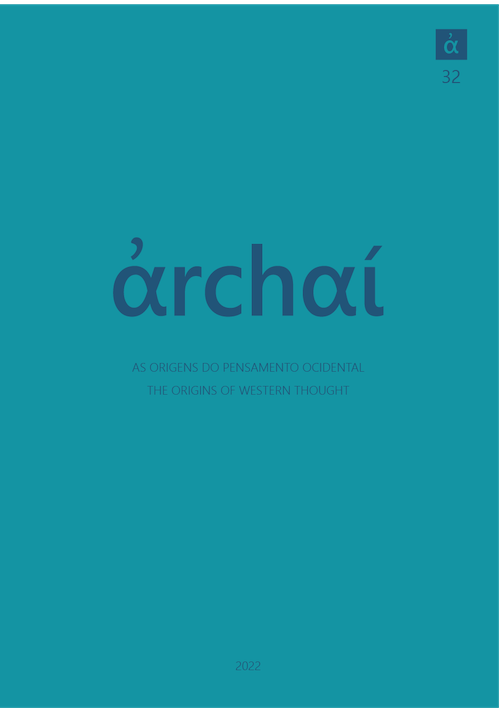A note on Aristotle’s Physics I 7, 190a31-34
DOI:
https://doi.org/10.14195/1984-249X_32_20Palavras-chave:
Aristotle, Physics, coming-to-be, tóde tiResumo
In this note I will defend the correct understanding of a passage (Physics I 7, 190a31-34) that has been largely misunderstood by many modern commentators. The reason for the misleading translations and interpretations can be found in the presence of the problematic expression tóde ti. In what follows, I will argue that there is no mention in this text of the expression tóde ti, at least in its technical sense, that can be traced in Aristotle’s philosophy. At the beginning I will give my translation of the passage in question and some information about the context of Physics I 7. Secondly, I will give an account of the language categories of “coming to be” and I will show that Physics I 7, 190a31-34 continues in all respects this linguistic analysis. Finally, I will discuss the work of ancient commentators, which can be read according to my interpretation.
Referências
AUBENQUE, P. (2000). Sur l’ambivalence du concept aristotélicien de substance. In: CORDERO, N.L. (ed.), Ontologie et dialogue: mélanges en hommage à Pierre Aubenque. Paris, Vrin, p. 93–105
BADAWI, A. (ed.) (1964). Arisṭūṭālīs al-Ṭabī‘a. Tarjamat Isḥāq ibn ḍunayn ma‘a shurūḥ Ibn al-Samḥ wa-Yaḥyā ibn ‘Adī wa-Mattā ibn Yūnus wa-Abī l-Faraj ibn al-Ṭayyib. Cairo, al-Dār al-qawmiyya li’l-ṭibā‘a wa’l-nashr.
BARNES, J. (1985). Aristotle. Complete Works of Aristotle: The Revised Oxford Translation. Princeton, Princeton University Press.
BODNÁR, I. (2018). Physics I.8. In: QUARANTOTTO, D. (ed.), Aristotle’s Physics Book I: A Systematic Exploration. Cambridge, Cambridge University Press, p. 206–25.
BOERI, M.D. (1993). Aristote. Aristote. Fisica. Buenos Aires, Biblos.
BOSTOCK, D. (1982). Aristotle on the principles of change in Physics I. In: SCHOFIELD, M.; NUSSBAUM M.C. (eds), Language and Logos: Studies in Ancient Greek Philosophy Presented to G. E. L. Owen. Cambridge, Cambridge University Press, p. 179–96.
CARTERON, H. (1926). Aristote. Aristote. Physique. Paris, Les Belles Lettres.
CERAMI, C. (2015). Génération et substance: Aristote et Averroès entre Physique et Métaphysique. Berlin-New York, De Gruyter.
CHARLES, D. (2018). Physics I.7. In: QUARANTOTTO, D. (ed.), Aristotle’s Physics Book I: A Systematic Exploration. Cambridge, Cambridge University Press, p. 178–205.
CHARLTON, W. (1970). Aristotle. Aristotle Physics. Books I and II. Oxford, Clarendon Press.
CODE, A. (1976). The Persistence of Aristotelian Matter. Philosophical Studies 29, p. 357–67.
CORKUM, P. (2019). This. Ancient Philosophy Today 1, p. 38–63
CORNFORD, F.M.; WICKSTEED, P.H. (1929). Aristotle. Aristotle. The Physics. Cambridge, W. Heinemann.
COULOUBARITSIS, L. and STEVENS, A. (1999). Aristote. Aristote. La physique. Paris, Vrin.
FRANCO REPELLINI, F. (1996). Aristotele. Aristotele. Fisica: libri I e II. Milano, B. Mondadori.
HORSTSCHÄFER, T.M. (1998). ‘Über Prinzipien’: Eine Untersuchung zur methodischen und inhaltlichen Geschlossenheit des ersten Buches der Physik des Aristoteles. Berlin-New York, De Gruyter.
JONES, B. (1974). Aristotle’s Introduction of Matter. Philosophical Review 83, p. 474–500.
LORENZ, H. (2019). The Principles of Natural Things–Two or Three? Physics I 7, Part 2. In: IERODIAKONOU, K.; KALLIGAS P.; V. KARASMANIS, V. (eds), Aristotle’s Physics Alpha: Symposium Aristotelicum. Oxford, Oxford University Press, p. 62–85.
MORISON, B. (2019). The Complexity of the Subject in a Change. In: IERODIAKONOU, K.; KALLIGAS P.; V. KARASMANIS, V. (eds), Aristotle’s Physics Alpha: Symposium Aristotelicum. Oxford, Oxford University Press, p. 62–85.
PELLEGRIN, P. (2000). Aristote. Aristote. Physique. Paris, Flammarion.
QUARANTOTTO, D. (2018). Aristotle’s Physics Book I: A Systematic Exploration. Cambridge, Cambridge University Press
RADICE, R.; PALPACELLI, L. (2011). Aristotele. Aristotele. Fisica. Milano, Bompiani.
REEVE, C.D.C. (2018). Aristotle. Aristotle. Physics. Indianapolis, Hackett.
RUGGIU, L. (1995). Aristotele. Aristotele. Fisica. Milano, Rusconi.
RUSSO, A. (1983). Aristotele. Aristotele. Fisica, Del cielo. Roma-Bari, Laterza.
SHARPLES, R.W. (1999). On Being a ΤΟΔΕ ΤΙ in Aristole and Alexander. Méthexis 12, p. 77–87.
SMITH, J.A. (1921). TOΔE TI in Aristotle. The Classical Review 35, p. 19–19.
STEVENS, A. (2012). Aristote. Aristote. La physique. Paris, Vrin.
WAGNER, H. (1983). Aristoteles. Aristoteles. Physikvorlesung. Berlin, Akademie Verlag.
WIELAND, W. (1992). Die aristotelische Physik. Untersuchungen über die Grundlegung der Naturwissenschaft und die sprachlichen Bedingungen der Prinzipienforschung bei Aristoteles. 3rd edn. Göttingen, Vandenhoeck & Ruprecht.
YU, J. (2003). The Structure of Being in Aristotle’s Metaphysics. New York, Springer Netherlands.
ZANATTA, M. (1999). Aristotele. Fisica di Aristotele. Torino, UTET.
ZEKL, H.G. (1987). Aristoteles. Aristoteles’ Physik: Vorlesung über Natur. Hamburg, F. Meiner.
Downloads
Publicado
Edição
Seção
Licença
Copyright (c) 2022 Luca Torrente

Este trabalho está licenciado sob uma licença Creative Commons Attribution 4.0 International License.
Dado o acesso público desta revista, os textos são de uso gratuito, com obrigatoriedade de reconhecimento da autoria original e da publicação inicial nesta revista. O conteúdo das publicações é de total e exclusiva responsabilidade dos autores.
1. Os autores autorizam a publicação do artigo na revista.
2. Os autores garantem que a contribuição é original, responsabilizando-se inteiramente por seu conteúdo em caso de eventual impugnação por parte de terceiros.
3. Os autores garantem que a contribuição que não está em processo de avaliação em outras revistas.
4. Os autores mantêm os direitos autorais e concedem à revista o direito de primeira publicação, sendo o trabalho licenciado sob a Creative Commons Attribution License-BY.
5. Os autores têm permissão e são estimulados a publicar e distribuir seu trabalho on-line após a publicação na revista.
6. Os autores dos trabalhos aprovados autorizam a revista a, após a publicação, ceder seu conteúdo para reprodução em indexadores de conteúdo, bibliotecas virtuais e similares.
7. É reservado aos editores o direito de proceder ajustes textuais e de adequação do artigo às normas da publicação.



